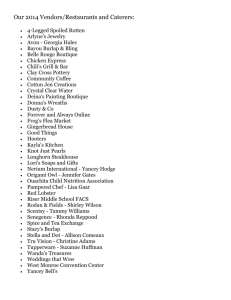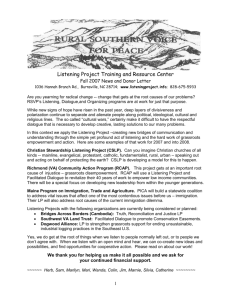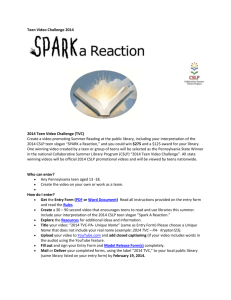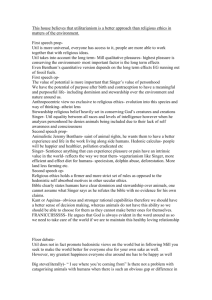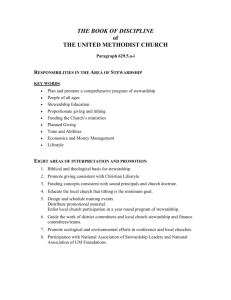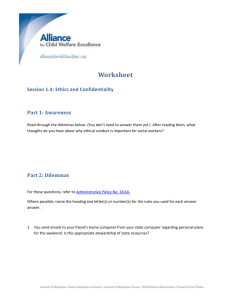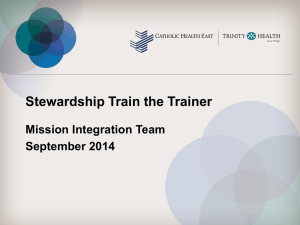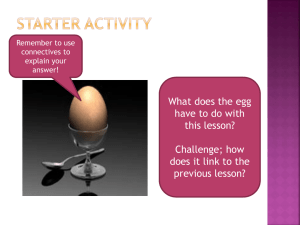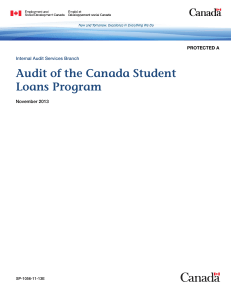25 Yancey Church Leaders Reflect On Stewardship
advertisement
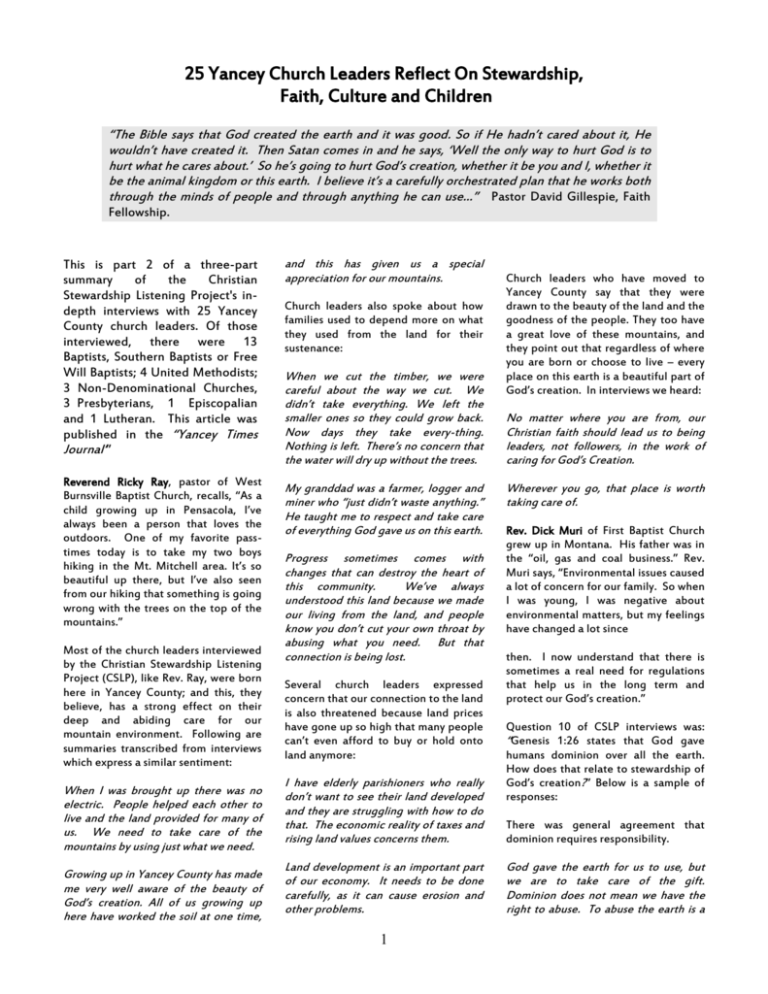
25 Yancey Church Leaders Reflect On Stewardship,
Faith, Culture and Children
“The Bible says that God created the earth and it was good. So if He hadn’t cared about it, He
wouldn’t have created it. Then Satan comes in and he says, ‘Well the only way to hurt God is to
hurt what he cares about.’ So he’s going to hurt God’s creation, whether it be you and I, whether it
be the animal kingdom or this earth. I believe it’s a carefully orchestrated plan that he works both
through the minds of people and through anything he can use…” Pastor David Gillespie, Faith
Fellowship.
This is part 2 of a three-part
summary
of
the
Christian
Stewardship Listening Project's indepth interviews with 25 Yancey
County church leaders. Of those
interviewed, there were 13
Baptists, Southern Baptists or Free
Will Baptists; 4 United Methodists;
3 Non-Denominational Churches,
3 Presbyterians, 1 Episcopalian
and 1 Lutheran. This article was
published in the “Yancey Times
Journal’”
and this has given us a special
appreciation for our mountains.
Reverend Ricky Ray, pastor of West
Burnsville Baptist Church, recalls, “As a
child growing up in Pensacola, I’ve
always been a person that loves the
outdoors. One of my favorite passtimes today is to take my two boys
hiking in the Mt. Mitchell area. It’s so
beautiful up there, but I’ve also seen
from our hiking that something is going
wrong with the trees on the top of the
mountains.”
My granddad was a farmer, logger and
miner who “just didn’t waste anything.”
He taught me to respect and take care
of everything God gave us on this earth.
Most of the church leaders interviewed
by the Christian Stewardship Listening
Project (CSLP), like Rev. Ray, were born
here in Yancey County; and this, they
believe, has a strong effect on their
deep and abiding care for our
mountain environment. Following are
summaries transcribed from interviews
which express a similar sentiment:
When I was brought up there was no
electric. People helped each other to
live and the land provided for many of
us. We need to take care of the
mountains by using just what we need.
Growing up in Yancey County has made
me very well aware of the beauty of
God’s creation. All of us growing up
here have worked the soil at one time,
Church leaders also spoke about how
families used to depend more on what
they used from the land for their
sustenance:
When we cut the timber, we were
careful about the way we cut. We
didn’t take everything. We left the
smaller ones so they could grow back.
Now days they take every-thing.
Nothing is left. There’s no concern that
the water will dry up without the trees.
Progress sometimes comes with
changes that can destroy the heart of
this community.
We’ve always
understood this land because we made
our living from the land, and people
know you don’t cut your own throat by
abusing what you need. But that
connection is being lost.
Several church leaders expressed
concern that our connection to the land
is also threatened because land prices
have gone up so high that many people
can’t even afford to buy or hold onto
land anymore:
I have elderly parishioners who really
don’t want to see their land developed
and they are struggling with how to do
that. The economic reality of taxes and
rising land values concerns them.
Land development is an important part
of our economy. It needs to be done
carefully, as it can cause erosion and
other problems.
1
Church leaders who have moved to
Yancey County say that they were
drawn to the beauty of the land and the
goodness of the people. They too have
a great love of these mountains, and
they point out that regardless of where
you are born or choose to live – every
place on this earth is a beautiful part of
God’s creation. In interviews we heard:
No matter where you are from, our
Christian faith should lead us to being
leaders, not followers, in the work of
caring for God’s Creation.
Wherever you go, that place is worth
taking care of.
Rev. Dick Muri of First Baptist Church
grew up in Montana. His father was in
the “oil, gas and coal business.” Rev.
Muri says, “Environmental issues caused
a lot of concern for our family. So when
I was young, I was negative about
environmental matters, but my feelings
have changed a lot since
then. I now understand that there is
sometimes a real need for regulations
that help us in the long term and
protect our God’s creation.”
Question 10 of CSLP interviews was:
“Genesis 1:26 states that God gave
humans dominion over all the earth.
How does that relate to stewardship of
God’s creation?” Below is a sample of
responses:
There was general agreement that
dominion requires responsibility.
God gave the earth for us to use, but
we are to take care of the gift.
Dominion does not mean we have the
right to abuse. To abuse the earth is a
sin against God and our brothers and
sisters.
Many people see dominion as a right. I
believe we should use things wisely, as
a gift from God.
Any kind of authority carries huge
responsibility.
For example, with
children, having care of them doesn’t
mean you can exploit them.
The responsibility was given to us by
God, and it is part of our accountability
back to God to maintain and pass the
blessings on.
Another area of responsibility – that
being to our children and grandchildren, was explored in question 9 of
CSLP interviews: "How might Christian
Stewardship of Creation benefit our
children and grand-children?" Here
are some summaries of what church
leaders said:
So they have clean water to drink. It
scares me the way they’re pumping oil
and waste into the earth near my
brother’s water supply. It’s hard to
believe those things still go on.
If we don’t steward the land, so many of
the experiences that I enjoyed growing
up here are going to be totally gone for
future generations.
Stewardship lets children learn about
what God has created. There is a
balance necessary to maintain our
mountains. Our examples will teach
our children that we need to protect
the land and nature.
Children copy what their parents do.
Parents should start by doing the right
thing and children will follow.
We need to use the common sense that
God gave us. We need to leave
something for our children, or when
they look at the mountains all they’ll
see is roads and houses.
So they {children} can breathe and eat
healthy food and swim in clean water.
Everything we do today will make or
break their lives.
“I’d like to go hiking on top of the Black
Mountains some day with my boys and
see that the forests are growing strong
once again,” says Rev. Ray.
The 25 church leaders interviewed by
CSLP
also
spoke
about
the
environmental problems facing our
county today. They believe that Yancey
County needs to find sensible solutions
that are considerate of the needs of
people and in particular the need for
jobs.
Gwen Harris, who recently retired as
director of Yancey County’s Economic
Development Commiss-ion and who is
a member of Windom United
Methodist Church, says, “There is no
reason why we can’t have both good
jobs and environmental protection.
2
We need to find the right balance and
continue working toward sus-tainable
economic development. That means
economic develop-ment that is good
for both the people and the
environment.”
In our next CSLP report, we will look at
what our church leaders think are the
most important environmental issues
we face today, and what do we need to
do to move towards sustainable
economic development. Most church
leaders agreed that environmental
issues sometimes cause divisions and
conflict; however, they also agreed that
by turning to their faith, Christians can
rise above this conflict and be a part of
creating and/ or supporting solutions.
Claude Vess, chair of the CSLP Steering
Committee says that CSLP plans
additional interviews, and will in the
fall, provide opportunities for dialogue,
prayer and reflection. “This will enable
us to see what our common concerns,
desires and priorities are for creation
stewardship.”
If you are interested in any form of
participation in CSLP, or in getting a
copy of the full Christian Stewardship
Listening Project Report, summarizing
25 interviews with Yancey County
Church leaders, contact CSLP c/o High
Pastures Christian Retreat Center, 290
Kings Highway, Burnsville, NC 28714.
Tel: 682-3138 or 7386; Email:
cvess@mhc.edu.
